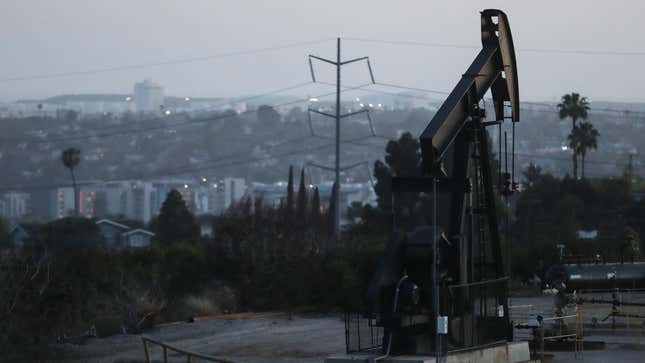
The biggest county in the nation just made moves toward stopping fossil fuel production.
On Wednesday, Los Angeles County took the first steps toward winding down oil extraction in unincorporated areas, which make up 65% of the county geographically. The Board of Supervisors unanimously voted in favor of a motion to prohibit new oil wells and evaluate existing ones. Currently, existing oil wells cannot legally be shuttered until owners recoup the costs of drilling, so the evaluation will determine if costs have been recouped for each site. The measure would also designate all existing oil and gas extraction activities as “nonconforming” uses, which could allow county officials to revoke drilling permits.
While the Hollywood sign and traffic may be the first thing that comes to mind with Los Angeles, the city and surrounding county are dotted with oil wells. The city alone is home to more than 1,000 wells, many hidden behind facades, and there are thousands more active and idle wells across the county.
If the measure is successful, it could shut down more than 1,600 wells, though the exact timeline has not yet been decided. Crucially, the decision would impact the Inglewood Oil Field, where more than half of the county’s wells are located. The 1,000-acre field in Los Angeles, which is the nation’s largest urban oil field, produces up to 3 million barrels of oil a year. More than 1 million people live within a 5-mile (8-kilometer) radius of the field, including several neighborhoods that are mostly populated by people of color.
“We have an opportunity and responsibility as the home of the largest urban oil field in the nation to lead by example in creating an equitable path for phasing out oil drilling,” Supervisor Holly J. Mitchell, who led the motion and represents the district where most of the Inglewood Oil Field operates, said in a statement.
The measure could be a boon for the climate and public health. People who reside near oil wells are exposed to cancer-causing air pollution which is correlated with everything from headaches and skin conditions to spontaneous preterm births and respiratory illness.
Activists have long raised the alarm about the environmental injustice concerns surrounding the Inglewood site. Last August, the council of Culver City, California, moved to wind down extraction at the 78 acres of the site that sit within city limits. The Los Angeles County Public Health Department worked with University of California, Los Angeles researchers to conduct a health assessment of the site in June. It’s expected to take 12 to 18 months before results are publicly available.
The environmental racism of fossil fuel drilling in Los Angeles County isn’t limited to the Inglewood Oil Field, either. A press release from Mitchell’s office notes that nearly 73% of the tens of thousands of residents who live near oil wells countywide are people of color.
“As someone who lives in close proximity to oil drilling, seeing motions introduced to begin the process to phase out oil drilling in LA County is exciting for frontline residents,” Ashley Hernandez, advocate with Communities for a Better Environment, said in a statement. “Our county has the opportunity to right the wrongs of racist land-use decisions such as redlining and expedited oil drilling permit approvals and has the power to step up for vulnerable families living, playing, and praying right next to oil drilling.”
While environmental and climate justice advocates are celebrating Wednesday’s vote, the oil and gas industry is unsurprisingly not too pleased. The California Independent Petroleum Association, which represents 500 independent oil and gas producers statewide, vocally opposed the measure. Before the vote, the trade group’s CEO sent a letter to the Board of Supervisors saying the proposal would harm ordinary people by taking away jobs and raising gas prices, the AP reported. He also said it would threaten California’s energy independence, forcing it to rely on foreign oil. The board paid the letter no mind and passed for the measure.
“I applaud the Board for continuing to move the County forward on this critical issue and the countless advocates that have helped get us to this point,” Supervisor Mitchell said in a statement. “Our work is far from done but this is a promising step for environmental justice.”